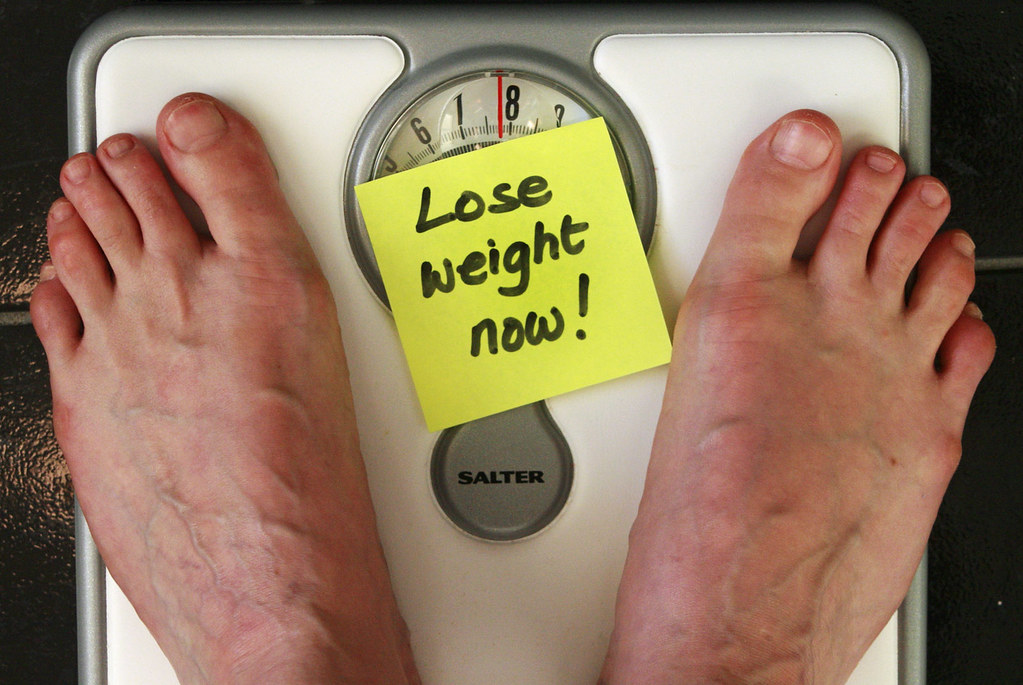If you’re like most people, you have probably experienced a weight loss plateau at some point during your diet. This can be frustrating and discouraging, but don’t worry – it’s not impossible to overcome! In this blog post, we will discuss some tips that will help you break through your weight loss plateau and continue on your journey to success!
Contents
Weight Loss Plateau
Here are the most common weight loss plateaus that can come across your weight loss journey and how to overcome them:
Not eating enough
 This is a common roadblock that many dieters face, as they often underestimate the amount of food needed to fuel their bodies. The key to overcoming this plateau is to make sure you’re eating enough calories to meet your body’s needs.
This is a common roadblock that many dieters face, as they often underestimate the amount of food needed to fuel their bodies. The key to overcoming this plateau is to make sure you’re eating enough calories to meet your body’s needs.
Studies have shown that eating too few calories can slow down your metabolism, making it more difficult to lose weight. One study published in the American Journal of Clinical Nutrition found that restricting calories to less than 1,200 per day can significantly reduce your metabolism and even cause weight gain. Furthermore, it can lead to nutrient deficiencies, fatigue, and other health issues.
Here are 9 tips to help you make sure you’re eating enough
- Track your calories: This will help you ensure you’re eating an appropriate amount of food. You can use an app or website such as MyFitnessPal to track your daily intake.
- Eat more protein: Incorporating lean sources of protein into your diet such as chicken, fish, and Greek yogurt can help increase satiety and make you feel fuller for longer.
- Eat more healthy fats: Adding healthy fats such as avocado, olive oil, nuts, and seeds can help you feel more satisfied after meals.
- Don’t skip meals: Skipping meals can cause you to overeat later in the day, so be sure to spread out your meals throughout the day.
- Eat nutrient-dense foods: Eating nutrient-dense foods such as fruits, vegetables, and whole grains will help ensure you’re getting enough vitamins and minerals to fuel your body.
- Focus on quality over quantity: Eating a few pieces of high-quality food is better than eating a lot of processed food.
- Drink plenty of water: Staying hydrated can help you feel satiated and prevent overeating. Additionally, it can also help your body metabolize fat more efficiently.
- Incorporate resistance training: Resistance training is an important part of any weight loss plan, as it helps build muscle and burn fat.
- Be patient: Weight loss takes time, so don’t be too hard on yourself if you don’t see results right away.
With these tips, you’re sure to break through your weight loss plateau and reach your goals. Just remember that gradual, sustainable changes are key!
Not Exercising Enough
Exercise is essential for weight loss, as it helps burn calories and builds muscle. But if you’re not exercising enough, it may be difficult to break through your weight loss plateau.
Studies have shown that regular exercise can have significant benefits on weight loss, including increased calorie expenditure and improved metabolism. One study published in the Journal of Sports Medicine and Physical Fitness found that regular exercise had a positive effect on body composition, fat mass, and metabolism. Moreover, it can help reduce body fat, increase muscle mass, and improve overall health.
Here are 10 tips to help you make sure you’re getting enough exercise
- Schedule regular workouts: This will help you stay consistent and motivated. Make sure you schedule your workouts at a time that works best for you.
- Choose activities you enjoy: Finding an activity you enjoy will make it easier to stick with it. Whether you like running, swimming, yoga, or cycling, find something that works for you and make it a part of your routine.
- Start slow: If you’re new to exercise, start with short workouts and gradually increase the intensity and length as you get stronger.
- Set realistic goals: Aim to increase the intensity or length of your workouts gradually over time, rather than trying to do too much too soon.
- Vary your routine: Doing the same workout every day can get boring, so mix things up and try different activities to keep it interesting.
- Try interval training: Interval training is a great way to burn calories and improve your fitness in a short amount of time.
- Strength training: Incorporating strength training into your routine will help build muscle and burn fat.
- Take rest days: It’s important to take breaks between workouts to allow your body to recover and repair itself.
- Make it social: Exercising with a friend or family member can be a great way to stay motivated and make it more enjoyable.
- Keep track of your progress: Tracking your progress can help you stay motivated and measure your progress. Use a fitness tracker or journal to record your workouts, what activities you did, and how you felt afterward. This can help you stay on track and reach your goals.
By following these tips and making exercise a priority, you’ll be well on your way to achieving your weight loss goals.
Eat enough protein
 Protein is an essential part of any healthy diet, as it helps build and maintain muscle mass. Eating enough protein can also help with weight loss, as it helps keep you feeling full for longer and increases your metabolic rate.
Protein is an essential part of any healthy diet, as it helps build and maintain muscle mass. Eating enough protein can also help with weight loss, as it helps keep you feeling full for longer and increases your metabolic rate.
Studies have found that diets higher in protein can help support weight loss, as well as reduce appetite and food intake. One study published in the American Journal of Clinical Nutrition found that diets higher in protein resulted in greater weight loss than those with lower levels. In addition, higher-protein diets can help reduce body fat and increase lean muscle mass.
Here are 10 tips to help you make sure you’re getting enough protein
- Eat a variety of sources: Eating a variety of different proteins is important, as this will provide your body with a variety of essential amino acids. Sources of protein include lean meats, fish, eggs, legumes, and dairy products.
- Include protein in every meal: Aim to include a source of protein with each meal, as this will help keep you feeling satiated for longer.
- Choose lean proteins: Opt for lean proteins such as chicken, turkey, and fish to reduce fat and calorie intake.
- Add plant-based proteins: Plant-based proteins are a good option for those looking to reduce their meat intake. Sources of plant-based protein include beans, lentils, quinoa, nuts, and seeds.
- Use protein powder: Protein powders are a convenient way to get your daily dose of protein. Look for a product that contains high-quality ingredients, such as whey or plant proteins.
- Eat healthy fats: Healthy fats such as avocado, nuts, and seeds are a great way to add calories and essential fatty acids to your diet.
- Make breakfast a priority: Eating a high-protein breakfast has been linked to improved satiety and weight loss. Choose options such as eggs, oatmeal, or Greek yogurt.
- Eat protein with carbohydrates: Eating protein with carbohydrates, such as whole grains, can help slow down digestion and improve satiety.
- Snack on protein: If you find yourself getting hungry between meals, reach for a healthy snack that contains protein, such as nuts, seeds, or Greek yogurt.
- Pay attention to portion sizes: It’s important to pay attention to portion sizes when consuming protein sources, as these can be high in calories. Aim to limit serving sizes to the size of your palm.
With these tips, you should have no trouble making sure you’re getting enough protein in your diet!
Get enough sleep
Getting enough quality sleep is essential for a healthy body and mind, as it helps to restore energy levels and improve concentration and focus.
Studies have found that those who don’t get enough sleep are at greater risk of obesity, heart disease, and depression (If you are facing depression you can also take depression counseling). One study published in the journal Sleep found that people who get less than seven hours of sleep per night are more likely to gain weight. What’s more, research has found that getting enough sleep can help regulate hormones associated with hunger and satiety, which can help support weight loss goals.
Here are 10 tips to help you get the sleep you need
- Establish a routine: Creating a consistent bedtime routine can help signal your body that it’s time to relax and sleep.
- Avoid screens before bed: The blue light from electronic devices can disrupt your body’s natural sleep cycle, so it’s best to avoid screens for at least an hour before bed.
- Exercise regularly: Exercise can help improve the quality of your sleep, as it reduces stress levels and helps to tire the body.
- Avoid caffeine late in the day: Caffeine can stay in your system for up to 8 hours, so it’s best to avoid caffeine late in the day if you’re having trouble sleeping.
- Avoid large meals before bed: Eating a large meal right before bed can disrupt your sleep, as your body needs to work to digest the food.
- Avoid alcohol before bed: While a glass of wine may help relax you, drinking too much can interfere with sleep quality.
- Take a warm bath: Taking a warm bath or shower before bed can help signal to your body that it’s time to relax and sleep.
- Invest in a comfortable mattress: Investing in a comfortable mattress can help improve sleep quality, as it reduces pressure points and allows your body to relax.
- Keep your bedroom cool: Keeping the temperature in your bedroom cool can help you sleep better, as the body naturally cools down during sleep.
- Limit noise and light: If possible, try to eliminate noise and light from your bedroom. If that’s not possible, consider using earplugs or an eye mask to help you sleep better.
By following these tips, you’ll be well on your way to getting the quality sleep you need!
Stay hydrated
 Staying hydrated is essential for overall health and wellness, as it helps to regulate body temperature, support digestion, flush toxins, and keep our bodies functioning optimally. Studies have also found that staying hydrated can help improve energy levels and mental alertness. One study published in the journal Frontiers in Nutrition found that even mild dehydration can lead to reduced cognitive performance.
Staying hydrated is essential for overall health and wellness, as it helps to regulate body temperature, support digestion, flush toxins, and keep our bodies functioning optimally. Studies have also found that staying hydrated can help improve energy levels and mental alertness. One study published in the journal Frontiers in Nutrition found that even mild dehydration can lead to reduced cognitive performance.
Here are 10 tips to help you stay hydrated
- Carry a water bottle with you: Carrying a refillable water bottle can help keep track of how much water you’re drinking throughout the day.
- Flavor your water: If plain water doesn’t appeal to you, try adding some lemon, lime, or cucumber slices to your water.
- Eat foods that are high in water: Eating fruits and vegetables with high water content, such as cucumbers, tomatoes, and watermelon can help keep you hydrated.
- Avoid sugary drinks: Sodas, juices, and other sugary drinks can have high amounts of sugar. Therefore, it’s best to avoid them if possible.
- Eat smaller meals: Eating smaller, more frequent meals throughout the day can help keep you hydrated. Hydration forces your body to digest more food and therefore requires more water.
- Monitor your urine color: Urine should be light yellow or clear. If your urine is dark yellow, it’s a sign that you need to drink more water.
- Avoid salty foods: Eating too much salt can make you more thirsty. It’s best to limit your intake of salty foods.
- Drink before and after exercise: Drinking water before and after exercise is essential. Keeping yourself hydrated can replace the fluids lost during physical activity.
- Monitor your environment: Pay attention to hot and humid environments, as your body will require more water to stay cool.
- Set reminders: Set alarms or reminders throughout the to help you remember to drink water.
By following these tips, you’ll be sure to stay hydrated and reap the many benefits of proper hydration!
Manage stress
Stress is an inevitable part of life and it can have serious consequences on both physical and mental health. Studies have found that chronic stress can contribute to high blood pressure, heart disease, and sleep problems. That’s why it’s important to find ways to manage stress and maintain a healthy lifestyle. One study published in the journal Stress and Health found that stress management strategies, such as relaxation techniques, exercise, and social support can be effective at reducing stress.
Here are 10 tips to help you manage stress
- Take breaks during the day: Taking regular breaks throughout the day can be an effective way to manage stress. A few minutes of stretching or taking a short walk can help clear your head. Moreover, taking breaks can give you time to refocus.
- Practice deep breathing: Deep, slow breaths can help relax the body and reduce stress. Taking a few minutes to focus on your breathing can help ease tension and anxiety.
- Get enough sleep: Not getting enough sleep can increase stress levels. It’s important to make sure you get enough rest each night.
- Establish healthy boundaries: Setting personal and work boundaries can help reduce stress levels. Prioritizing tasks, delegating responsibilities, and saying no can help keep your stress levels in check.
- Take time for yourself: Self-care is an important part of managing stress. Taking time for yourself to do something you enjoy. Things like reading a book or going for a walk can help reduce stress levels.
- Exercise: Regular physical activity can be an effective way to manage stress. Taking a brisk walk, running, or doing yoga can help reduce stress and improve mood.
- Connect with friends: Connecting with friends can provide emotional support and help reduce stress. Talking about your worries or concerns can be an effective way of relieving stress.
- Just say no: Saying no to requests or commitments that are not feasible can help reduce stress levels. Learning to say no and setting boundaries can help you manage stress more effectively.
- Identify sources of stress: Understanding the source of your stress is an important step in managing it. Keeping a journal can help you identify patterns and triggers for your stress.
- Seek professional help: If these strategies are not enough to manage your stress levels, seek professional help. A therapist or counselor can provide additional techniques and strategies to reduce stress.
By following these tips, you’ll be able to effectively manage stress and maintain a healthy lifestyle.
Conclusion
Staying hydrated and managing stress are two important components of a healthy lifestyle. Drinking plenty of water throughout the day and reducing your intake of salty foods can help you stay properly hydrated while finding effective strategies to manage stress can help reduce its negative effects on physical and mental health. By following these tips, you’ll be able to stay hydrated and manage stress more effectively!
Consider contacting FitMantra for additional information on nutrition and fitness. You can also get in touch with their nutrition experts through our online nutrition counseling, who can guide you through the process and help you achieve your fitness goals. You can also lose weight with the help of our weight loss program. Download our Fitness app on Android to learn more about us.
